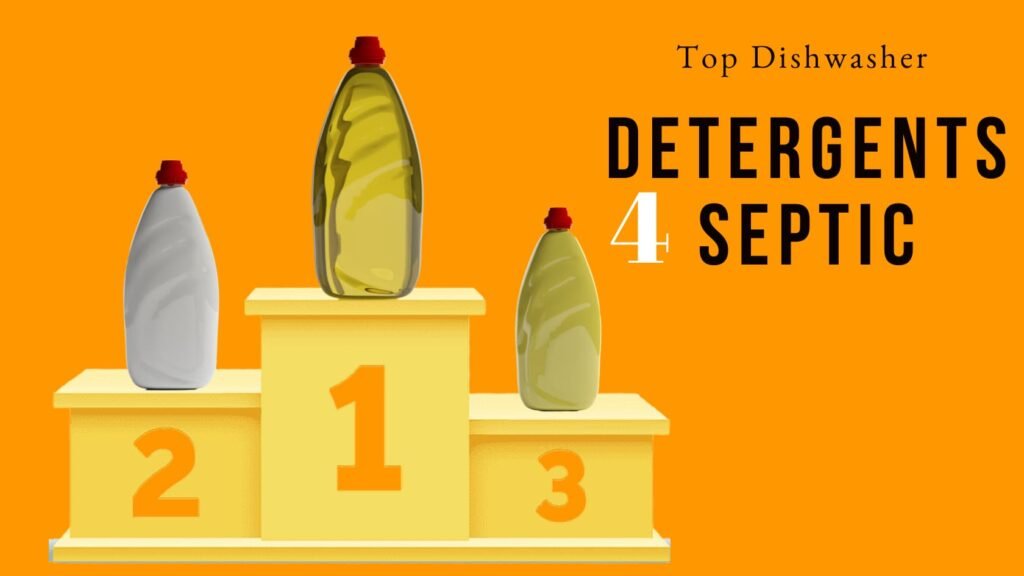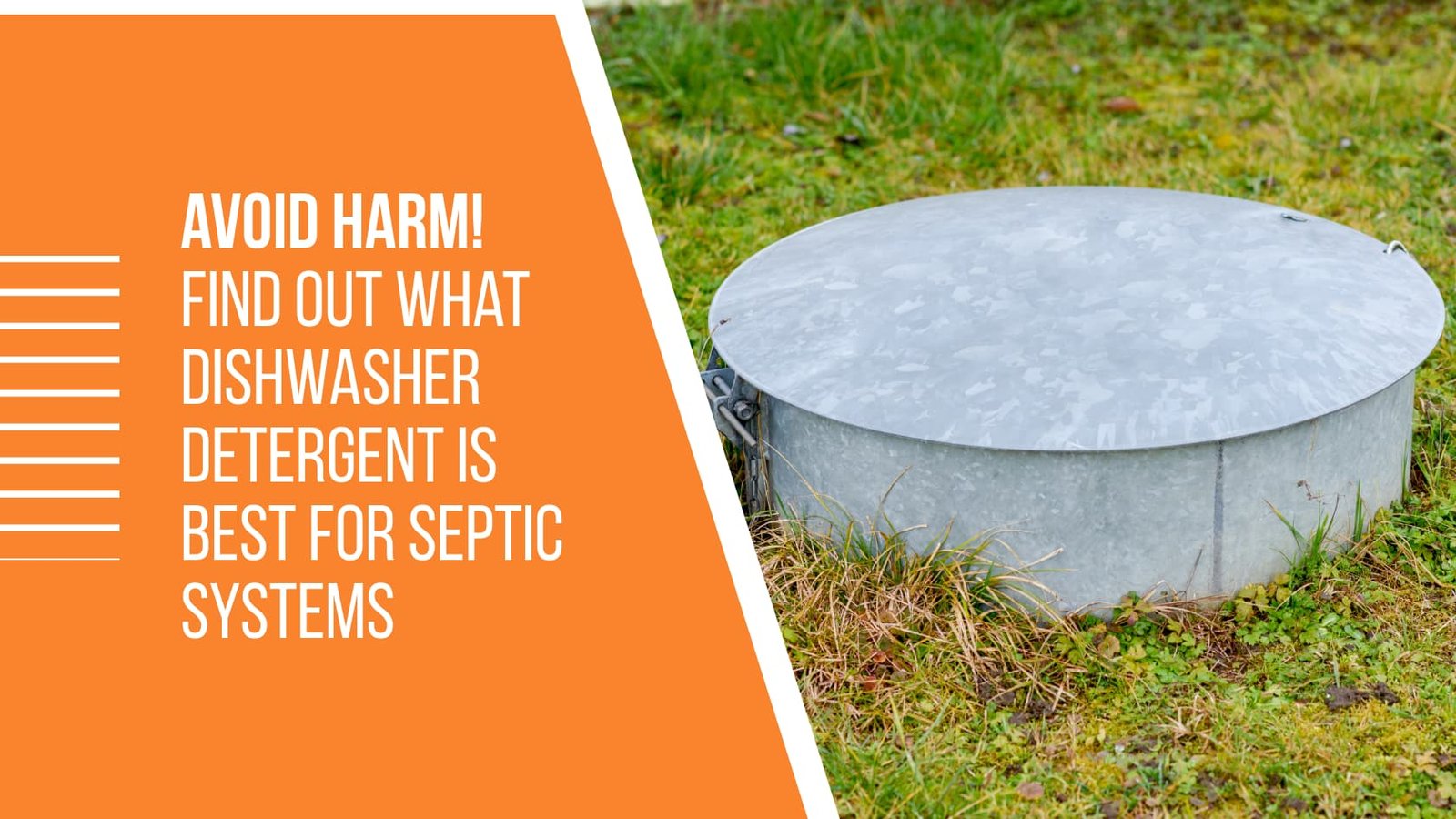Are you a septic system owner looking for the best dishwasher detergent to avoid harm to your system?
Choosing the right dishwasher detergent is crucial to maintaining a healthy and efficient septic system.
With so many options available, it can be overwhelming to determine what makes a dishwasher detergent septic-safe and which ingredients to avoid.
Understanding what dishwasher detergent is best for septic systems is essential for protecting your septic system from potential damage.
In this article, we will delve into the key ingredients to avoid and provide you with tips on how to choose the right dishwasher detergent for your septic system.
Additionally, we will recommend some top dishwasher detergents that are safe for septic systems, as well as provide usage tips and maintenance advice for septic system owners.
Some links in this post are affiliate links, meaning, at no additional cost to you, we may earn a commission if you click through and make a purchase. As an Amazon Associate, I earn from qualifying purchases.
What Makes a Dishwasher Detergent Septic-Safe?

Dishwasher detergents that are safe for septic systems are specially formulated to achieve cleanliness without compromising the function of your tank.
A septic-safe detergent must contain ingredients that will not disrupt the breakdown process that naturally occurs with the help of beneficial bacteria.
When shopping for a detergent suitable for households with septic tanks, you should pay close attention to the product labels. Look for terms like “septic-safe” or “biodegradable“.
The primary feature of a septic-safe dishwasher detergent is the absence or minimal use of ingredients that could harm the bacteria in septic tanks.
Ingredients such as bleach can be too harsh and should be used sparingly or avoided totally in septic system-friendly products.
Also, we encourage the use of low-sudsing agents because excessive suds can cause problems in the septic system. It blocks oxygen flow, which bacteria need to survive.
Key Ingredients to Avoid
When maintaining a septic system, the key to avoiding harm to your tank is to steer clear of certain hazardous ingredients in your dishwasher detergent.
These ingredients include
Phosphates: Phosphates can cause overgrowth of algae in water systems. This growth depletes oxygen for fish and other aquatic life, and eradicates the beneficial bacteria in septic tanks.
Antibacterial Agents: Common in many cleaning and personal care products, these agents can be detrimental to the necessary bacteria in your septic tank. Ingredients like triclosan, for instance, are designed to kill bacteria, which is counterproductive in a system that relies on bacterial balance.
Bleach: In large quantities, bleach can be harmful to the septic tank’s bacterial environment. Look for detergents with low or no bleach content, especially chlorine bleach, to ensure the health of your septic system.
Fillers: Some detergents include water-insoluble fillers, which can contribute to the buildup of solids in your septic tank. This buildup will potentially lead to clogs and the need for more frequent pumping.
By opting for detergents without these harmful ingredients, you’ll ensure a longer life for your septic system and contribute to a healthier environment.
How to Choose the Right Dishwasher Detergent

Selecting the right dishwasher detergent is crucial not just for clean dishes but also for the environment and your home’s septic system. When making your choice, consider these factors:
Labels and Certifications to Look For
Opt for products with clear labels indicating their suitability for septic systems. Here’s what you need to keep an eye out for
Eco-Friendly: Products with this label are crafted to minimize environmental impact, using natural components that are gentle on both your septic system and natural waterways.
Biodegradable: This label means the detergent will naturally decompose, reducing potential pollution and safeguarding aquatic ecosystems.
Non-Antibacterial: Non-antibacterial detergents protect the delicate balance of your septic tank by preserving the vital bacteria that break down waste.
Phosphate-Free: Aim for detergents that eschew phosphates, which not only damage aquatic habitats with algae blooms but can also upset the microbial equilibrium within your septic system.
Recommended Types of Detergents
Here are the detergent types that usually meet septic-safe criteria
Gel: Gel detergents dissolve smoothly and are less prone to leave a residue. For those with a septic system, choosing a gel that is eco-friendly or specially marked as septic-safe ensures chemical content is appropriate.
Tablets and Pods: These options offer convenience and precise dosage. To protect your septic tank, verify that these products are free from harmful additives by looking for a septic-safe label.
Powders: Powdered detergents let you adjust the amount used per load. They’re an excellent choice for septic systems when formulated to be phosphate-free and biodegradable.
Top Dishwasher Detergents for Septic Systems

When it comes to taking care of your septic system while ensuring sparkling clean dishes, not all dishwasher detergents are created equal.
Here are some of the best septic-safe dishwasher detergents we recommend. They are renowned for their eco-friendly and effective cleaning
Ecover Dishwasher Tablets – These tablets are not only eco-conscious but also biodegradable and phosphate-free, making them perfect for your septic tank’s health.
Seventh Generation Detergents – With a focus on plant-based ingredients, Seventh Generation’s detergents avoid phosphates and harsh chemicals, offering a gentle and sustainable option.
Method Dishwasher Detergents – Known for combining efficacy with environmental care, Method’s detergents ensure a septic-friendly clean.
Finish Quantum – Strong on grime yet mindful of septic systems, Finish’s Quantum range is biodegradable and devoid of phosphates, as per the manufacturer’s assurance.
Biokleen Dishwasher Detergents – Championing non-toxic and eco-friendly cleaning, Biokleen’s products are gentle on both the environment and septic tanks.
Choosing any of these detergents will help maintain a healthy septic system while keeping your dishes spotless.
Usage Tips for Septic System Owners
Septic system owners must adopt mindful usage and maintenance practices to ensure the longevity and efficiency of their systems.
Since systems like dishwashers contribute to both water load and chemical input, it’s essential to use them responsibly.
By following some key tips, you can prevent issues that could lead to costly repairs or even system failure.
Dishwasher Best Practices
To optimize your dishwasher’s role in a harmonious relationship with your septic system, consider employing the following best practices
Full Loads Only: Always run your dishwasher when it’s completely full. This efficient approach saves water and energy and results in fewer cycles, reducing the strain on your septic system.
Eco-Friendly Detergents: Opt for detergents that are labeled as biodegradable, phosphate-free, and septic-safe. Such products are less harmful to the vital bacteria in the septic tank that break down waste.
Stagger Appliance Use: Avoid operating the dishwasher and other water-intensive appliances, like washing machines, at the same time. By spacing out their usage, you can help prevent overwhelming your septic system with too much water at once.
Scrape, Don’t Rinse: Before placing dishes in the dishwasher, scrape off excess food into the trash. Pre-rinsing dishes can waste water and contribute unnecessary solids to your septic system, leading to potential blockages.
Maintenance Tips for Septic Systems
Regular maintenance is crucial to keep your septic system functioning correctly. Here are some essential maintenance tips
Regular Inspections and Pumping: Have a professional inspect your septic system each year and pump it as needed, generally every three to five years. This schedule can vary based on your household size and usage patterns. Regular pumping helps prevent the buildup and overflow of solids.
Conserve Water: Reducing your overall water use can lessen the burden on your septic system. Fix any leaks, invest in low-flow fixtures, and choose appliances with good water efficiency ratings.
Avoid Harsh Chemicals: Steer clear of using harsh chemicals that can damage the bacteria in your septic tank. Many typical household cleaners and some dishwasher detergents contain substances that are detrimental to the balance of your septic system.
Protect the Drain Field: The drain field is a crucial component of your septic system. Keep it free from heavy vehicles or structures, and watch out for encroaching roots from trees or large plants. The drain field needs an undisturbed environment to properly treat and disperse the wastewater.
Conclusion
In summary, the health of your septic system depends largely on the choice of dishwasher detergent and responsible appliance use.
Eco-friendly detergents, specifically those that are biodegradable, free of phosphates, and non-antibacterial, are the best companions for septic tanks.
They preserve the critical bacteria needed to decompose waste effectively.
Septic-Safe Habits Include
Running your dishwasher only with full loads
Staggering the use of water-intensive appliances
Conserving water whenever possible
Avoiding the introduction of harsh chemicals into your septic system
Also, a commitment to regular inspections and scheduled pumping of your septic system cannot be overstated.
It is as vital as choosing the correct detergents.
By integrating these mindful practices into your daily routine, you can ensure both the durability of your septic system and the overall sustainability of your household operations.

Pazi Mboh, our Home Efficiency Advocate, is dedicated to promoting sustainable dishwasher use. His tips on energy and water efficiency not only help the environment but also save on your bills, making his guidance invaluable for eco-conscious households.





